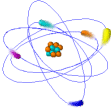
Fractal Research/Products
Artificial variants of DNA

 |
Fractal Research/Products Artificial variants of DNA |
 |
|
DNA
look-alike fools enzyme Enzymes evolved to work
with DNA accept a cheap imitation, say US researchers. DNA polymerase, that copies
chromosomes before a cell divides, will duplicate a synthetic molecule
called threose nucleic acid - TNA - Jack Szostak and his colleagues
at Harvard General Hospital in Boston have found. One motivation is to explore how life began. DNA and RNA are complicated, and must have been preceded by something simpler. Szostak and his colleagues think that TNA is a candidate. Analogues of DNA and RNA might also be medically useful. Proteins, which run cells, are assembled on an RNA template. A molecule that can stick to RNA but is different enough to evade the enzymes that break it down might prevent unwanted proteins forming. Thirdly, artificial nucleic acids might, like RNA, help certain chemical reactions occur. Szostak and his colleagues want to randomly mutate and select TNA molecules in a test tube, to find ones with desirable properties. This artificial evolution has been used to make DNA and RNA with new functions. Faking it But artificial evolution uses real enzymes. Will they work on TNA too? The researchers tested this by trying to make DNA on a TNA template. In the cell, DNA polymerase sticks to a single strand of DNA unwound from the double helix. The enzyme moves slowly along, building a complementary strand like the one that the DNA strand was originally paired with. DNA polymerase can make DNA on a TNA template, provided that the enzyme has a short length of DNA to get it going, the team found. The copying isn't very good: the enzyme generally runs out of steam after putting in place just 1-3 DNA building blocks. But given the differences between TNA and DNA,
it is remarkable that it works at all. And artificial evolution might
find a polymerase enzyme that is more tolerant of TNA. © Nature News Service / Macmillan Magazines
Ltd 2003 |